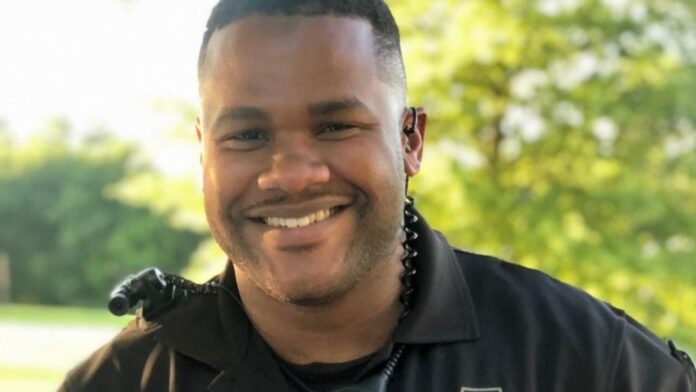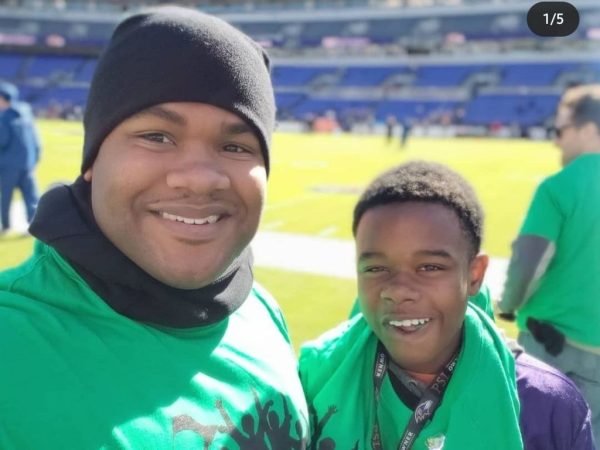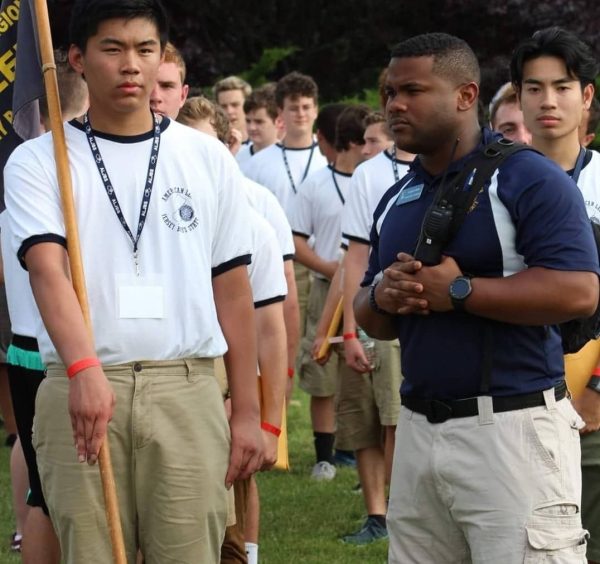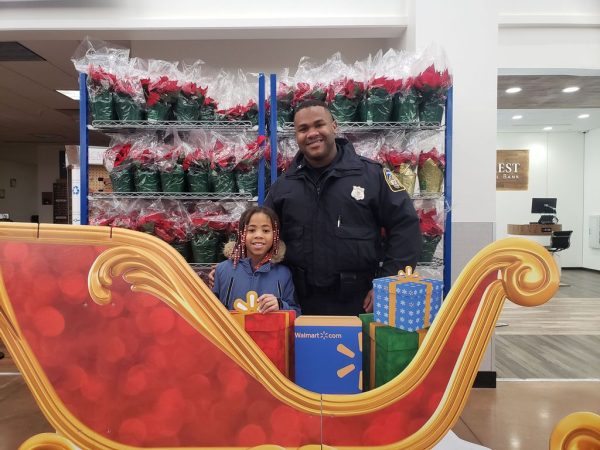
By Lem Satterfield, Zenger News
Carlyle Riche Jr. is a passionate advocate for mental health and an active agent of the change he envisions.
The 30-year-old crisis intervention police officer in Baltimore County, Maryland, aims “to help and protect those who can’t protect themselves.”
Named Baltimore County’s Crisis Intervention Officer of the Year for 2021, Riche hopes to create a nonprofit for black teen boys “as a safe space for them to express themselves and feel supported, accepted and not judged.”
Riche, who is pursuing a master’s degree in clinical mental health counseling at Liberty University in Virginia, earned a bachelor’s degree at the University of Maryland in 2017 and a master’s degree in behavioral management from Saint Joseph’s University in Philadelphia in 2018.
He is targeting a doctorate in studies related to mental health and the police response to mental health crises.
As a crisis intervention trainer in Baltimore County, Riche attends police-community events, such as National Night Out. He sees the importance of fostering a positive relationship with community members and shares his thoughts on altruism, advocacy and healing with Zenger.
Let’s start by detailing your philanthropic endeavors.

For the past 12 years, I have been a volunteer youth counselor and diversity, equity and inclusion co-adviser for the American Legion Jersey Boys State program in Lawrenceville, New Jersey. This program is geared toward high school juniors. It is a selective, week-long, college-preparatory leadership seminar that can prepare its participants for careers in politics, military, business and law, among many others. I am a lead youth counselor and senior staff member that manages the day-to-day instruction of a group of young men for that week, along with my assistant counselors.
I am also a volunteer for the Big Brothers Big Sisters – Greater Chesapeake Chapter of the YMCA in Baltimore City, and the Baltimore County Police Youth Leadership Academy.
Why do you do all those things?
My “why” is to give back and to be a support for others.
I attended the American Legion Jersey Boys State program when I was in high school and had been returning on staff ever since my time in it. I learned so much about networking and public speaking during my time [there]. I enjoy helping mold young men into the future leaders of America.
I am passionate about the Big Brothers Big Sisters organization. I have been a mentor in this program for about three years now and have been matched with my “little brother” for the same time. Words cannot describe the sense of pride I get from supporting my mentee. I don’t personally have a little brother, so it is great to be in a position to positively impact my mentee. We were matched well and have similar interests, as well.
He’s an introvert just like me, and I get to show him what was helpful for me at his age to help him traverse obstacles in his life. It has been wonderful seeing him grow and overcome many challenges in our short time thus far being matched.

Can you discuss how substance use, trauma, racial issues or anything from your lived experiences has influenced your decision to become a police officer?
My decision to be a police officer was influenced by seeing my parents in their corrections officer uniform and my desire to want to help and protect others who can’t protect themselves. At a young age, I realized that I was a protector and that there were individuals with ill-intentions out in the world.
I have always been interested in learning what made people tick and motivations behind their behaviors, which is why I enjoy what I do as a crisis intervention officer. I am in a position to serve those with mental health challenges, and I love what I do.
As a police officer, it was never about arrests, or the persona of being a police officer. For me, it was about finding real solutions for problems and building relationships between law enforcement and community.
What is your earliest experience with racism?
The first encounter with racism that I’ve had was when I moved out of Camden [New Jersey] into a house in a suburban area of southern New Jersey. When I was in high school, I dated a young lady in my class that happened to be white. Her father was a white police officer in our town, a small, predominately white town.
One day, we were sitting on her front steps, and he had pulled up to the home. It would have been the first time he and I would have met. As he approached the house and I stood up to extend my hand for a handshake (like my father taught me), he walked right by me as if I were not there.
It was even more difficult to process because he was a police officer — the very thing that I aspired to be. At that time, I was taken aback, hurt and confused, because little did he (her father) know I wanted to occupy the same position, wear the same uniform, uphold the same oath and honorably wear the same badge.
But all he saw that day was a black boy trying to date his daughter. He didn’t see the insightful, well-spoken and respectful young man that stood before him. I felt invisible; I internalized that experience and would move on to carry that with me for many years.

How are you an agent of change regarding police and existing negative cultures about them?
It’s crucial to aid in changing the narrative for police officers. To do the vital work of building relationships with the community must be an unwritten rule for every police officer. A police officer can be effective at their job without being demeaning, curt or abusive.
I recall when individuals I have had to arrest or cite during traffic violations have thanked me for treating them with respect and like human beings. My main goal as a police officer was best said by Gandhi, to “Be the change you wish to see in the world.”
There are undoubtedly individuals with negative intentions in the profession. However, many more intend to do great things for their community — many of which I have served alongside. I enjoy policing and working with the community.
Some of the highlights of my career have been working National Night Out events, Shop with a Cop, and Trunk or Treat events at local churches in my patrol areas. Times when I can stop and get out with kids in the area to start building relationships and helping to change that narrative are essential to me.
In some of my interactions, it was apparent that some of our youth could benefit from having positive role models in their lives — just another level of support. Having many conversations with young teens about being in their position when I was their age can help to change their perspective. If their perspective doesn’t change, at least they can feel heard and not judged.
What is your role in the crisis response unit?
A crisis intervention officer is trained to effectively respond to crisis events and be knowledgeable of the various avenues to guide an individual toward additional support. The topic of police response to mental health calls has been under intense scrutiny lately, and for the right reasons.
I take pride in being a first responder who can vibrantly and effectively respond to mental health and/or crisis situations. I believe it takes a particular person to be able to serve someone in that capacity. I believe that unique quality is enhanced when you have lived experience with mental health challenges.
That individual can listen more intently, display empathy and walk with that individual through their experience — a great example of the support that is necessary in these intense situations. I am passionate about mental health crisis response and adding to the narrative that some officers can effectively respond to mental health calls for service.
I assist with crisis intervention training for my department, where I co-teach de-escalation, a self-developed course for police officers — a topic I feel strongly about. I was recently named Baltimore County’s Crisis Intervention Officer of 2021 — a highlight of my career thus far and an honor that I do not take lightly. I take pride in being a CIT officer and passionate mental health advocate.
What are your goals?
I aim to continue serving those with mental health challenges as a crisis intervention officer, continue my efforts in bolstering the police response to crisis events, and to eventually increase my footprint in the mental health field as a practicing mental health clinician.
During crisis calls, I often self-disclose that I am in therapy and am still working through challenges. There is light at the end of the tunnel. My hopes are to normalize addressing mental health concerns, especially among people of color.
We have been told to suck it up, “man up,” and not express ourselves, which is killing us. We must talk, we must pay attention to our mental health.
Edited by Judith Isacoff and Matthew B. Hall


